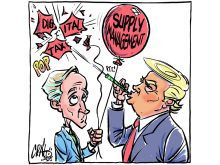IN THE exaggerated language of politicians and the journalists who cover them, last weekend’s Reform party convention was “historic.”
It may turn out to be, although it is far from a sure thing. There are many hurdles before the Reform replacement, the Canadian Conservative Reform Alliance, actually challenges the Liberals for power.
For many reasons, history among them, this may never happen. But at the very least, the decision by Reformers to kill their party if two-thirds of members approve the move in a March referendum was rare act of political bravery.
Read Also

Agriculture needs to prepare for government spending cuts
As government makes necessary cuts to spending, what can be reduced or restructured in the budgets for agriculture?
Few political leaders would have tried the gamble Preston Manning is trying and fewer still could have carried it off as Manning seems to be doing.
In fact, it is difficult to find such an audacious act of political leadership in Canadian history.
There have been other attempts at historic coalitions, of course. Most have been short-lived or had limited impact.
The most important coalition was the Conservative Party, which Canada West Conservative leader John Macdonald put together in 1864 to create Canada.
Macdonald risked everything to drag his anti-Catholic, anti-French, Orange Lodge-dominated party into a coalition with the leader of Quebec’s conservatives, George Etienne Cartier. The result was the founding of the country in 1867. The coalition held together for more than 20 years.
Other coalitions have had at least short-term success.
In 1917, Conservative leader and prime minister Sir Robert Borden folded his party into a Unity party in favor of war conscription and it attracted most English Liberals to win the 1917 election. It lasted just three years until new Liberal leader William Lyon Mackenzie King attracted English Liberals.
In 1961, the Co-operative Commonwealth Federation decided to fold itself into a farmer-labor coalition called the New Democratic Party. The coalition has held but it has failed to produce the electoral breakthrough the CCF dreamers imagined.
Then there was Brian Mulroney’s nine-year experiment at creating a coalition between western conservatives, Ontario Tories and Quebec separatists. It held for nine years and won him two elections but almost destroyed the Progressive Conservative Party in 1993.
Manning’s attempt to meld his western base with Ontario’s successful Conservative machine is no less a gamble. But without a major change in Canada’s political landscape, his march to power seems far less possible than Mulroney’s.
There is little in Manning’s unilingualism or the new party’s support for equal provinces that will appeal to Quebec.
It means that to win 152 seats and government, the new party would have to win 67 percent of all seats outside Quebec – a difficult task.
At the very least, though, Manning’s manoeuvre attracted powerful figures from successful provincial conservative parties. It puts the heat on Joe Clark and the struggling remnants of the PCs to either prove they are relevant or to join the new conservative bandwagon.
Of course, Reformers don’t think Clark is a real conservative anyway. They probably think he would jump to the NDP.
















